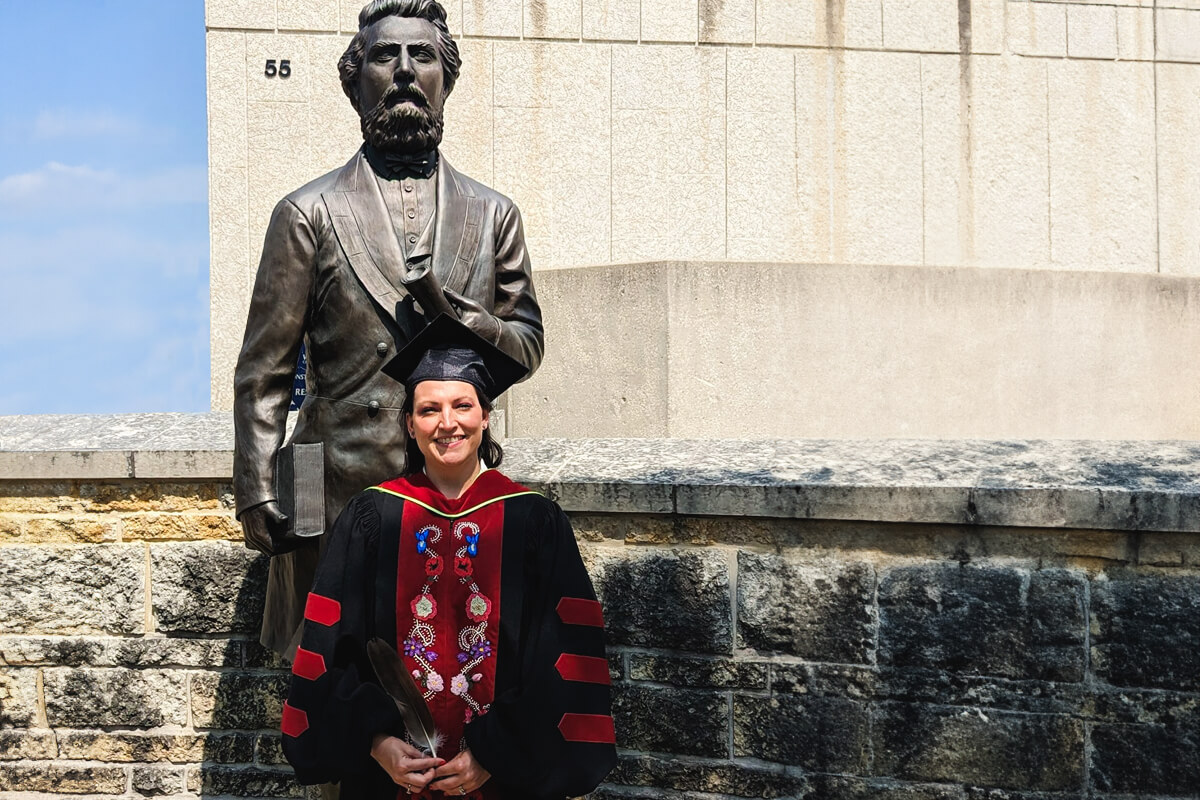
Laura Forsythe on graduation day, in front of the statue of Louis Riel near Migizii Agamik.
Breaking the silence on Métis research
After attending university for 35 consecutive terms, Laura Forsythe is the proud recipient of a PhD – her fourth degree.
But for the majority of her education, Forsythe – who is Red River Métis – found the achievements of her fellow Métis scholars were notably absent.
“Despite my bachelor of arts in First Nations studies, a bachelor of education in Indigenous perspectives, and a master’s in native studies, I had read very few texts by Métis women,” she explains. “I heard very few lectures by Métis women. I was wholly unaware of the magnitude of the contributions of Métis women theorists and academics to scholarship. It took me years to uncover the truth about other Métis women and our shared experience in the academy.”
Her efforts have garnered a University of Manitoba Distinguished Dissertation award for her research as a graduate student which identified 11 points of erasure experienced by Métis women during their time in academia.
Forsythe spoke to 13 grandmothers and aunties of Métis scholarship born between 1949 and 1969 who navigated and persisted in academic environments that did not acknowledge them. Of the 11 erasures, three themes emerged: colonial attempts at erasure; attempts to make Métisness invisible; and power structures’ attempts to silence Métis voices.
An example of these are the obstacles Métis scholars have faced when attempting to publish their Métis-specific work. For some, Forsythe explains, they faced rejection, loss of creative control, undermining of their voices and misrepresentation through the editing process.
She quotes from the experience of Dr. Jeannine Carrière, whose research focuses on child welfare, and her efforts to publish. Carrière said: “If I am publishing on something Métis-specific, that’s when it becomes challenging, and that’s when there is a bit of eye-rolling around whether it is credible, authentic, useful, will-it-sell kind of thoughts that go through the publisher’s minds … there is still a lot of ignorance around who we are.”
The result of decades of erasure is that Métis scholarship is often unheard of, as Forsythe experienced during her own time in academia.
“One of the perceptions is that there is a lack of Métis research – and that is absolutely unfounded and untrue. The grandmothers and aunties I spoke with have been in the academy writing and publishing for the last 40 years.
One of the things we find with Métis scholars is that we are put under an Indigenous umbrella, which is First Nations centric. And most of the research that’s done around Indigenous administration, Indigenous faculty, Indigenous students doesn’t actually speak to or reach the Métis community. Because we do have our own methodologies, our own ways of being and knowing through research.”
In fact, Forsythe intertwined both Métis-specific methodologies and approaches from Indigenous studies —Keeoukaywin, Lii Taab di Faam Michif, and Kishkeeyihtamaaniwan Kaa-natohtamihk— as a theoretical framework for her dissertation.
She hopes that her work will not only raise awareness of Métis contributions and impact in academia, but also help future scholars thrive. To this end, Pawaatamihk: Journal of Métis Thinkers, has published a collection of advice from the grandmothers and aunties that Forsythe interviewed.
She continues to advocate for Métis voices in academia and is currently an assistant professor. This past fall, she co-hosted the Métis Research Symposium, noting: “My research identified that we needed to get people together, that we needed to have this kind of energy and momentum and know of each other to be able to lift up each other’s ideas.”
University of Manitoba Distinguished Dissertation Awards are given to graduating doctoral students who have been nominated by their faculty/college/school for a dissertation that represents a ground-breaking piece of original work. Each year, one award is offered in each of the following categories: applied sciences, health sciences, humanities, natural sciences, and social sciences. Awardees receive a $3,000 prize.
Curious about graduate studies? Check out all of UM’s graduate programs.






